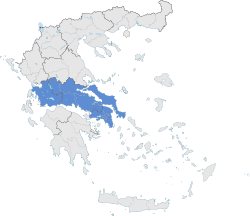Sterea Ellada
|
Continental / Central Greece Στερεά / Κεντρική Ελλάδα |
|
|---|---|
| Traditional region of Greece | |
 Continental Greece (blue) within Greece |
|
| Capital | Athens |
| Subdivisions | |
| Area | |
| • Total | 24,818.3 km2 (9,582.4 sq mi) |
| Population | |
| • Total | 4,591,568 (2,001 census) |
| • Density | 185/km2 (480/sq mi) |
| Demonym(s) | Stereoelladites, Roumeliotes |
Continental Greece (Greek: Στερεά Ελλάδα, Stereá Elláda; formerly Χέρσος Ἑλλάς, Chérsos Ellás), colloquially known as Roúmeli (Ρούμελη), is a traditional geographic region of Greece. In English the area is usually called Central Greece, but the equivalent Greek term (Κεντρική Ελλάδα, Kentrikí Elláda) is more rarely used.
It includes the southern part of the Greek mainland (sans the Peloponnese), as well as the offshore island of Euboea. Since 1987, its territory has been divided among the administrative regions of Central Greece and Attica, and the regional unit (former prefecture) of Aetolia-Acarnania in the administrative region of Western Greece.
The region has traditionally been known as Roúmeli (Ρούμελη), a name deriving from the Turkish word Rūm-eli, meaning "the land of the Rūm [the Romans, i.e. the Byzantine Greeks]" and originally encompassing all of the Ottoman Empire's European possessions. The official name Stereá Elláda ("Continental" or "Mainland" Greece), derives from the juxtaposition with the Peloponnese peninsula across the Corinthian Gulf, and the fact that these two territories formed the independent Greek state after the Greek War of Independence.
...
Wikipedia
